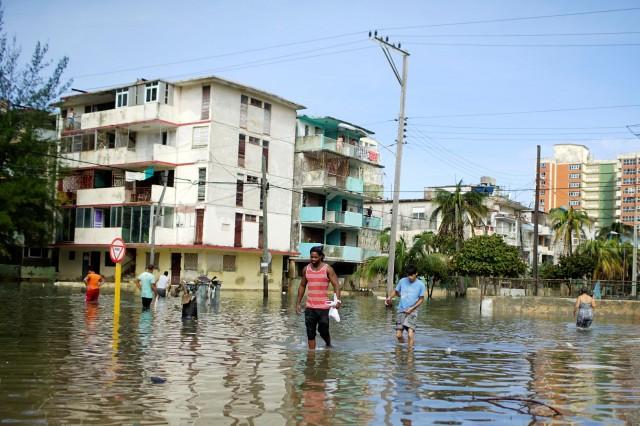Hurricane Irma kills at least 10 Cubans, most in building collapses

HAVANA, Cuba - At least 10 people were killed in Cuba by Hurricane Irma, most of them crushed by collapsing buildings, authorities said on Monday, bringing the death toll from the ferocious storm to 38 in the Caribbean.
Seven of the dead were in the province of Havana, while fatalities also were reported in Matanzas, home to the tourist resort of Varadero, and the regions of Ciego de Avila and Camaguey farther east, according to a statement from civil defense authorities.
The storm crashed into Cuba late on Friday as the first Category 5 hurricane, with sustained winds of than 157 mph (253 kph), to make landfall on the island since 1932, state media reported.
The eye of the hurricane scoured the islands on Cuba's northern coast. Even its outer reaches were powerful enough to send waves of up to 36 feet (12 meters) chasing into Havana's historic seafront boulevard on Sunday.
"Given the immensity of its size, practically no region escaped its impact," Cuban President Raul Castro said in a statement published in state-run media on Monday. He called for Cubans to unite in order to rebuild the country.
"The task we have before us is immense but with a people like ours, we will win the most important battle: the recovery."
Irma, which had winds of more than 160 mph (260 kph) by the time it reached Cuba, progressed for some 200 miles (322 km) along the island's northern shore before the eye of the storm turned northward on Sunday to batter Florida.
Its winds tore off roofs, felled trees and downed electricity poles, causing flooding in many coastal towns, including the capital Havana, and leaving millions without electricity.
Two of the victims died in Central Havana, infamous for its creaking infrastructure, when a balcony crashed down onto their bus. Authorities attributed two other deaths to a collapsed roof and three to building collapses.
Castro said authorities had not been able to assess the full extent of damage yet, but the hurricane had impacted housing stock and the power grid, as well as agriculture.
State media said on Monday Irma had seriously damaged Cuba's already dilapidated sugar industry, flooding and flattening an extensive area of sugar cane.
While many of Cuba's top resorts on the northern islands took a direct hit from the hurricane, Castro said they would be fixed up in time for high tourist season at the end of the year.
Many tourists flew home ahead of Irma, but others hunkered down in hotels and shelters.
"Tropical paradise turned into hell for us," said Spanish tourist Michel Munoz, 31, who said he spent the hurricane sheltering in a Havana convent and had struggled to find food on Sunday as most restaurants were closed.
Excavators have started the laborious task of removing debris and fallen trees from roads throughout the island. Trucks carried drinkable water to the worse-affected areas and some Cubans started to clean up their houses that had been flooded or suffered damage. — Reuters



